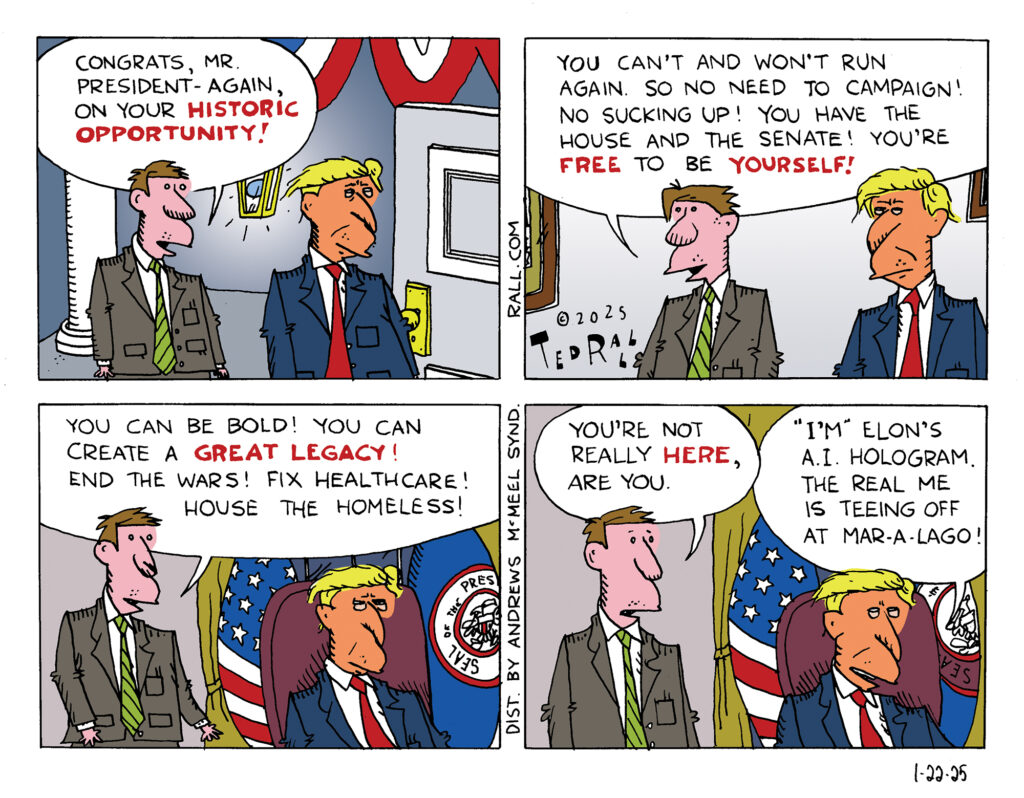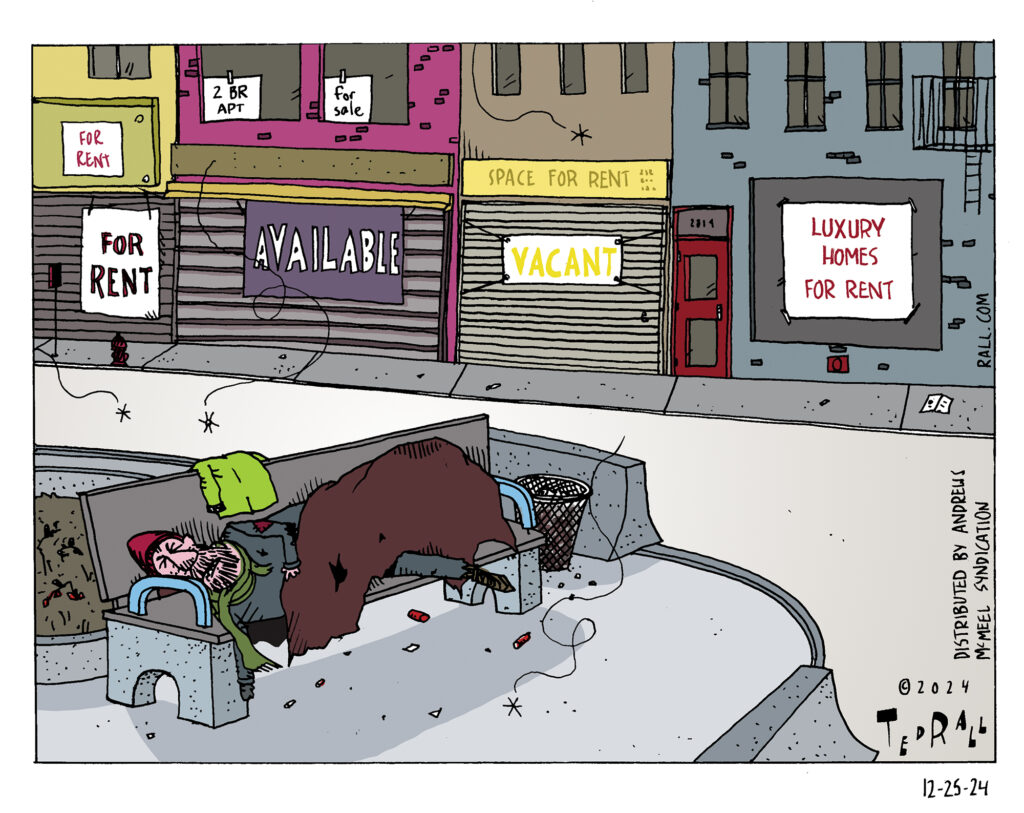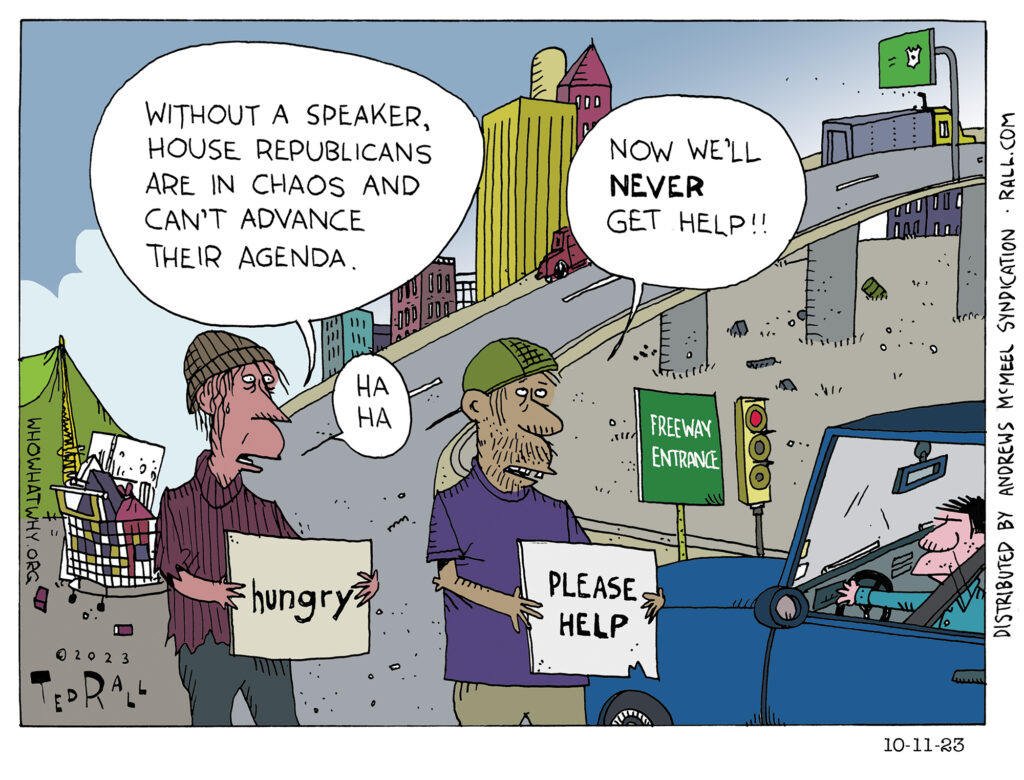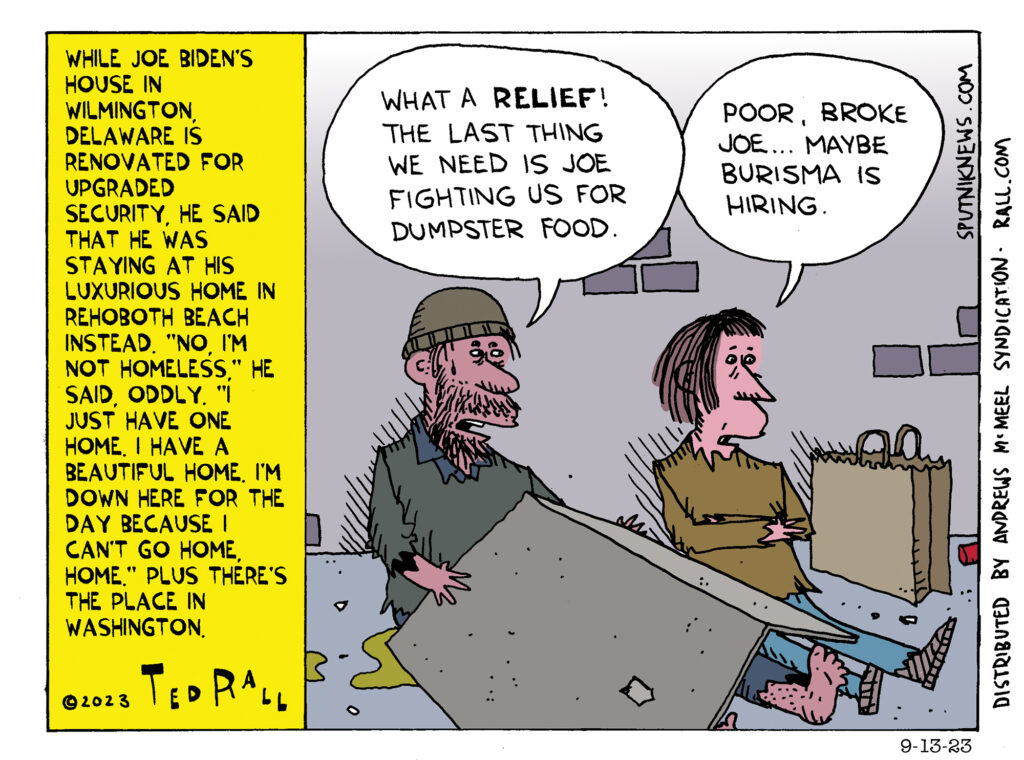For the first time in the era of presidential term limits, we now have a president who is both a lame duck but also incredibly free to do whatever he wants to leave behind an impressive legacy by which he can be remembered. Will he avail himself of that opportunity?
Born To Kill
Cities have been hollowed out in the aftermath of the COVID-19 pandemic and the rise of working at home. As office buildings emptied out, urban dwellers were asking themselves why they were paying so much rent to commute to a job that no longer requires them to do so. As warm apartments and storefronts sit empty, there’s probably never been a more searing indictment of capitalism than the fact that American citizens continue to sleep outside in the cold.
Why Can’t Kamala Talk Dude?
One of the most persistent challenges faced by Kamala Harris’ abbreviated presidential campaign is a vexingly wide gender gap. Men just aren’t that into her.
Democrats have deployed several approaches to convince male voters to feel the joy.
Divide and conquer: Harris’ policies divvy up guys by race. Her “opportunity agenda for Black men” would offer special loans and internships to Black entrepreneurs (no word on whether that’s been lawyered for constitutionality), fund federal studies on sickle-cell anemia and other diseases that disproportionately affect Black men and give them priority to profit from the emerging legal marijuana business (note to Democrats: cannabis equity failed in New York). Harris’ “opportunity agenda for Latino men” (see a trend?) would offer Latino guys more small business loans. A Google search for “opportunity agenda for white men” comes up empty but hey, there are still a couple hours left in the race.
Kamala is also playing the class card. A spot for the Pittsburgh TV market features a Steelers fan and maintenance worker who calls himself a “yinzer” (Pittsburgh native). “Donald Trump does not care about the working man whatsoever,” he says. “He’s a little rich kid too; he ain’t me. Little silver spoon boy Donald Trump. How is he relatable to me whatsoever? The guy literally lives in a country club. Do I look like a country club kind of guy?” Don’t tell the yinzers that Harris, worth $8 million and a member of an exclusive country club with a $300,000 initiation fee, is more at home with the Trumps than with them.
Humor: A Harris super PAC made news with “Man Enough,” an ad that showcases six hypermacho dudes—evoking more than a smidge of homoeroticism (“my full-throated endorsement”)—who say they’re so butch that they eat “carburetors for breakfast” and aren’t “afraid of bears,” but also like chicks and plan to vote for Harris and support abortion rights. An official Harris ad depicts a burly Black finance bro who ditches his plan to refrain from voting after confronted by a passel of disapproving ladies. Ladies are doters for early voters!
Shame and guilt: Former president Barack Obama called out sexist men whom, he finger-wagged, “just aren’t feeling the idea of having a woman as president.” His wife Michelle helpfully reminded the XY set that “your wife and mother could be the ones at higher risk of dying from undiagnosed cervical cancer because they have no access to regular gynecological care.” As if men didn’t care about their wives, sisters, mothers and female friends.
This is a portrait of a campaign that wants men’s votes enough to embarrass itself, but isn’t willing to do much, if anything, to earn them. Democrats suffer from a prepositional disconnect: Harris and her surrogates talk at men, not to or, better still, with them.
If she loses to Trump, a major contributing factor will be the perception that Harris and the Democrats don’t like men.
This is puzzling. Harris knows men. She’s married to one. Most of her Senate colleges are men. Her running mate is a guy, albeit a goofy beta. Why can’t Kamala speak fluent dude?
A more talented politician would recognize male voters—especially white male voters—less as an obstacle to fool, bully or circumnavigate than as what they realty are: virgin electoral territory.
American men are suffering from a set of very real, very serious problems with which neither political party has begun to identify, much less engage.
One of Trump’s superpowers in 2016 was his recognition of the pain, frustration and anger of Rust Belt voters (including men) left behind by deindustrialization to wallow in poverty, addiction and dysfunction. Trump, and now his running mate J.D. Vance, described the shuttered factories and the blighted neighborhoods in places like Dayton, Ohio, where I grew up. They argued that American citizens deserved better and promised to fix it. Trump didn’t fix it as president. Maybe he couldn’t.
But he did see the people of Flyover Country. That was enough to take over the GOP, defeat Hillary Clinton and build the MAGA movement.
Today, boys and men represent an even bigger untapped reservoir of political support for the politician and party with enough vision to recognize it. Males are in crisis. They are angry and confused.
Men are in crisis.
They are desperate for compassion and looking for leadership.
Males are far more likely to abuse and become addicted to illegal drugs than females. Boys drop out of high school more than girls. Males are 50% of the population yet account for most fatal cancer and nearly 80% of suicides. Trapped in an increasingly feminized system of primary, secondary and higher education with rules designed for “calmer” females, boys and men are now being taught that they are historically responsible for rape, colonialism, imperialism and every other conceivable form of oppression. They are ordered to sit silently by as they are passed over for jobs, awards and other opportunities in order to make up for the historic sins of systemic sexism and misogyny. Men cannot and should not be proud of masculinity or maleness.
They ought be ashamed. As a liberal pundit put it in 2019, “Old White Men Like Me Need to Shut Up and Step Aside.”
The Male Problem blows up during adulthood. 58% of college students are women; 42% are men. Moreover, women graduate in higher numbers—68% compared to 61% for guys—so the proportion of women with college degrees in the workforce is even higher. This is not a new problem; colleges began admitting more girls than boys in 1979. Nor is it a correction. Flipping a historical injustice, sexual discrimination, on its head does not redress it; it merely reverses the role of victim and oppressor.
Cultural progressives posit an identitarian version of trickle-down economics in which equity erases the old gender pay gap that favored men, lifting up women without hurting men. But wages are a zero-sum game that men are losing. “In 1979, the median hourly wage for women was 62.7% of the median hourly wage for men; by 2012, it was 82.8%,” according to the left-leaning Economic Policy Institute. “However, a big chunk of that improvement—more than a quarter of it—happened because of men’s wage losses, rather than women’s wage gains.”
Gender inequality increasingly looks like a two-way street, with males bearing the brunt not only economically but socially because high-earning women are not willing to marry, support or subsidize lower-achieving men. Trophy husbands, cultural shifts notwithstanding, are not a thing.
It’s hardly surprising that the unabashedly macho swagger of Trumpism finds a receptive audience among America’s lost boys. As the conservative activist Charlie Kirk told Vanity Fair, guys “want to be part of a political movement that doesn’t hate them.”
That’s not the Democrats.
(Ted Rall (Twitter: @tedrall), the political cartoonist, columnist and graphic novelist, co-hosts the left-vs-right DMZ America podcast with fellow cartoonist Scott Stantis. His latest book, brand-new right now, is the graphic novel 2024: Revisited.)
Millions Have No Home. You Don’t Need Two.
 Responding to polls that show that voters are worried and angry about the high cost of housing, both major parties are floating plans to make buying a home more affordable. Harris and the Democrats want to encourage new housing construction and subsidize first-time home buyers by $25,000, which economists worry would have an inflationary effect. Trump thinks that deporting illegal immigrants would reduce demand and lower prices—a logical stretch to say the least.
Responding to polls that show that voters are worried and angry about the high cost of housing, both major parties are floating plans to make buying a home more affordable. Harris and the Democrats want to encourage new housing construction and subsidize first-time home buyers by $25,000, which economists worry would have an inflationary effect. Trump thinks that deporting illegal immigrants would reduce demand and lower prices—a logical stretch to say the least.
As important as it is to allow middle-class and working-class people to build wealth by investing in a house or condo, however, the real need is not those who would prefer to own than to rent their residence. The real need is those who have no housing at all.
Roughly half a million Americans are chronically homeless and nearly four million more “hidden homeless” are imposing on friends and family for a place to stay that may or may not remain available in the future. Cities are blighted, families are shattered, children are traumatized. Homelessness is both a moral and economic crisis as well as a failure of leadership.
Homelessness impacts us all. Every person who must be treated at the emergency room as a consequence of going unhoused not only burdens the healthcare system, they live outside the workforce who contribute to productivity, fuel consumer spending and remit payroll taxes. Their deprived physical persons, their meager possessions and their vehicles are eyesores that negatively impact property values and thus reduces municipal revenues. People experiencing homelessness and housing insecurity get arrested more often than the average citizen, only for survival offenses like stealing food and clothing. Many are or become mentally ill, especially from schizophrenia, as a result of fending off hot and freezing weather; homeless people commit about thirty times more violent crimes than average.
According to the National Alliance to End Homelessness, it would cost about $55 billion, most of it spent once rather than recurring, to house both the visible and hidden homeless, who total about 4.5 million people. But where would we put all these people?
Incredibly, that answer is easy. There’s no need to build a single new unit. We have plenty lying around completely unused.
More than 15 million homes, over 10% of the nation’s housing stock, was vacant in 2022—a record low. Three out of four are investment properties, many owned by venture-capital companies that are converting neighborhoods once comprised of local homeowners into transient rental units with algorithmically-inflated rents, particularly in middle-class areas with many people of color. Most of these are vacation homes, timeshares and hunting cabins that sit empty well over 95% of the year.
Property rights matter, but a national emergency like a war prompts the government to requisition private property in service to an important cause. During World War II, for example, the United Kingdom commandeered personal cars and paid their former owners what they determined to be fair market value, while the United States requisitioned merchant ships. U.S. occupation forces appropriated German land for military use in the late 1940s.
Homelessness is a national emergency on par with World War II. Actually, it’s much bigger. Had the isolationists prevailed and the U.S. not joined the Allies against Japan and Germany, there is no reason to believe that the U.S. itself would ever have been invaded. For America, World War II was optional. Fighting homelessness is about saving the lives of millions of American citizens right here at home. It’s as essential as it gets.
Florida and Hawaii, both popular vacation destinations, have more vacant second homes than other states. But the vacation-house mentality also afflicts cities with high densities—or that used to have them. In the 2005-2009 American Community Survey, 102,000 of the 845,000 apartments and houses in Manhattan were identified as vacant. One out of 25 units in the nation’s cultural, media and financial capital were occupied less than two months out of the year. “In a large swath of the East Side [of Manhattan] bounded by Fifth and Park Avenues and East 49th and 70th Streets, about 30% of the more than 5,000 apartments are routinely vacant more than ten months a year because their owners or renters have permanent homes elsewhere,” The New York Times reported in 2011. It’s worse now.
The number of vacant units in New York City lines up almost exactly with the estimated number of homeless men, women and children: 100,000.
Every single person who shivers on the sidewalks of the Big Apple does so within a few dozen feet of a heated, insulated, empty apartment with running water, a place that no one uses. It’s obscene. It’s piggish. And it needs to be fixed. A real estate speculator’s right to invest in a housing market is not half as important as a homeless person’s need to sleep inside. A bourgeois family’s desire to winter in Florida and summer in New York must take a back seat to the human right of a homeless person not to die.
City and state housing authorities should be granted the right and the funding appropriations necessary to seize vacant housing units under eminent domain for conversion to housing for the homeless, with fair market compensation to be paid to those deprived of their properties.
The United States signed the Universal Declaration of Human Rights, which recognizes housing as a basic human right, in 1948. The UDHR was codified into a treaty, the International Covenant on Economic, Social, and Cultural Rights in 1966. Because the U.S. signed the ICESCR, it is obligated to uphold its “object and purpose.” Nearly eighty years after our nation committed to ensuring that everyone has a decent and secure place to live where he or she need not fear eviction, it should make good on its commitment to international law.
Condemn vacant investment properties and vacation homes and seize them under eminent domain.
Until the last American citizen moves from the outdoors to the indoors, no one should be legally permitted to own more than one home.
(Ted Rall (Twitter: @tedrall), the political cartoonist, columnist and graphic novelist, co-hosts the left-vs-right DMZ America podcast with fellow cartoonist Scott Stantis. His latest book, brand-new right now, is the graphic novel 2024: Revisited.)
Another Casualty of the Cashless Society
I live in New York City, where many homeless people rely on panhandling in order to get by. A few days ago I saw a Millennial woman turn down a request from a homeless man, saying, “I don’t carry cash.” I have long been concerned about the ramifications of our increasingly cashless society, like the ability of the government to lock down our bank accounts and ability to move freely. As usual, the poorest among us are paying the biggest price for what we’ve been told is progress.
Mr. President, Please Kill the Homeless Woman Who Lives Outside My Apartment
/cdn.vox-cdn.com/uploads/chorus_image/image/65080120/shutterstock_1281388108.0.jpg)
Dear Mr. President,
Won’t you please kill the homeless woman who lives on a bench on the median strip of the street near my apartment building?
She doesn’t bother me. As far as I know, she doesn’t bother anyone else either. The woman who lives in the middle of the street is nice. I like her. Last week, as I was waiting for the traffic signal to change, she beckoned softly from under her pile of soiled blankets, asking for change, and I gave her a ten-dollar bill. I’m not usually that nice. She’s that sympathetic.
I pitied her. I’ve watched her decline since spring. As six months dragged by this probably-fiftysomething-year-old woman has deteriorated from “how did someone so normal become homeless?” to talking to herself to severely sunburned to “this person will die this winter.”
It was in the high 30s last night and it will only get colder and it is not a question of when or how she’ll die—the answers are (a) this winter and (b) hypothermia—but whether the usual circle of votive candles and $5 bouquets of flowers will be placed by her bench or on the southwest corner of the intersection near the other one.
They say that dying of cold isn’t that bad. That you feel warm, cozy, disoriented.
I don’t believe them. Whatever the physical sensations, dying from cold a hundred feet from a couple hundred housing units so overheated that many New Yorkers keep their windows open all year long has got to be one hell of a lonesome suck of depressing. The nice woman who lives in the median deserves better than drawing her final breath while staring at the glow of a laptop screen through a frosted window pane the opposite side of which, under different circumstances, she would live inside.
So, Mr. President, won’t you please kill this lady? You’d be doing her a favor.
I know this isn’t your fault, sir. In a different world, you could allocate the tens of thousands of dollars needed to provide my outside neighbor with emergency shelter, transitional housing, permanent rehousing, substance abuse and/or mental health treatment. In reality, that money is tied up. The government’s budget is stretched thin. You have a massive deficit to think about.
Plus you have big expenses. For example, you’re asking Congress for $106 billion “in funding for Israel, Ukraine, countering China in the Indo-Pacific, and operations on the southern U.S. border.” These are, obviously, all very important needs. Before she succumbed to schizophrenia, the woman who is going to die in my New York neighborhood wouldn’t dream of suggesting that her desire to live indoors ought to come ahead of countering China in the Indo-Pacific.
I understand. If she hadn’t gone crazy, she’d understand too. Defense is one pot. A big pot. Anti-poverty is another pot. A very small pot. Like the tiniest pot in the smallest dollhouse ever. Everyone knows—you can’t “just” move money from one pot to another pot. That’s not something we even want to think about.
All that military spending got me thinking, though. Although Ukraine and Israel and Taiwan clearly need fighter jets and tanks and drones and ships and cyber weapons and missiles and bombs and light arms and bullets in order to kill as many Russian and Palestinian and Chinese people as possible, will they really miss…one?
Euthanizing a homeless New Yorker wouldn’t require anything as fancy as one of the MGM-140 Army Tactical Missile Systems we’re sending to Ukraine. This lady isn’t worth $1.5 million. Not to mention, one ATACM would take out a whole block or two—including my place!
I’m thinking something more modest, along the lines of the Switchblade 300 “suicide” drone, another gizmo we’re providing to Ukraine. As I’m sure you’re aware, Mr. President, the AeroVironment Switchblade is an expandable loitering munition so small it can fit in a backpack. You launch it from a tube. Then it flies to and crashes into its target, where its explosive warhead detonates. Like the homeless, it’s expendable. And it’s only $6,000!
Come on, Mr. President: We both know the Ukrainians and the Israelis and Taiwanese don’t need all the weapons we’re sending them. The Ukrainians don’t; they’re selling the extras we send them on the black market and the dark web. I only need one. One!
I know—“operations on the southern U.S. border” address an existential threat to America. What if an illegal terrorist migrant were to sneak past the border wall and make his way to New York and then were to kill the homeless woman on my street who would otherwise die of exposure this winter? Of course, that would be OK.
Still. It’s not like you can’t let $6,000 “accidently” fall out of your budget for “operations on the southern U.S. border.” Send that drone. Please blow up the old lady.
(Ted Rall (Twitter: @tedrall), the political cartoonist, columnist and graphic novelist, co-hosts the left-vs-right DMZ America podcast with fellow cartoonist Scott Stantis. You can support Ted’s hard-hitting political cartoons and columns and see his work first by sponsoring his work on Patreon.)
Related: Biden Sends Billions Overseas As Americans Starve (Short Video)
Hot Take 4: Biden Sends Billions Overseas While Americans Starve Here
President Biden wants to send $106 billion to Ukraine and Israel. That’s five times the amount of money that it would take to make sure no American is sleeping on the street this winter. Leftist political cartoonist Ted Rall does not think this is OK.
Ukraine and Israel Are Very Special Democracies
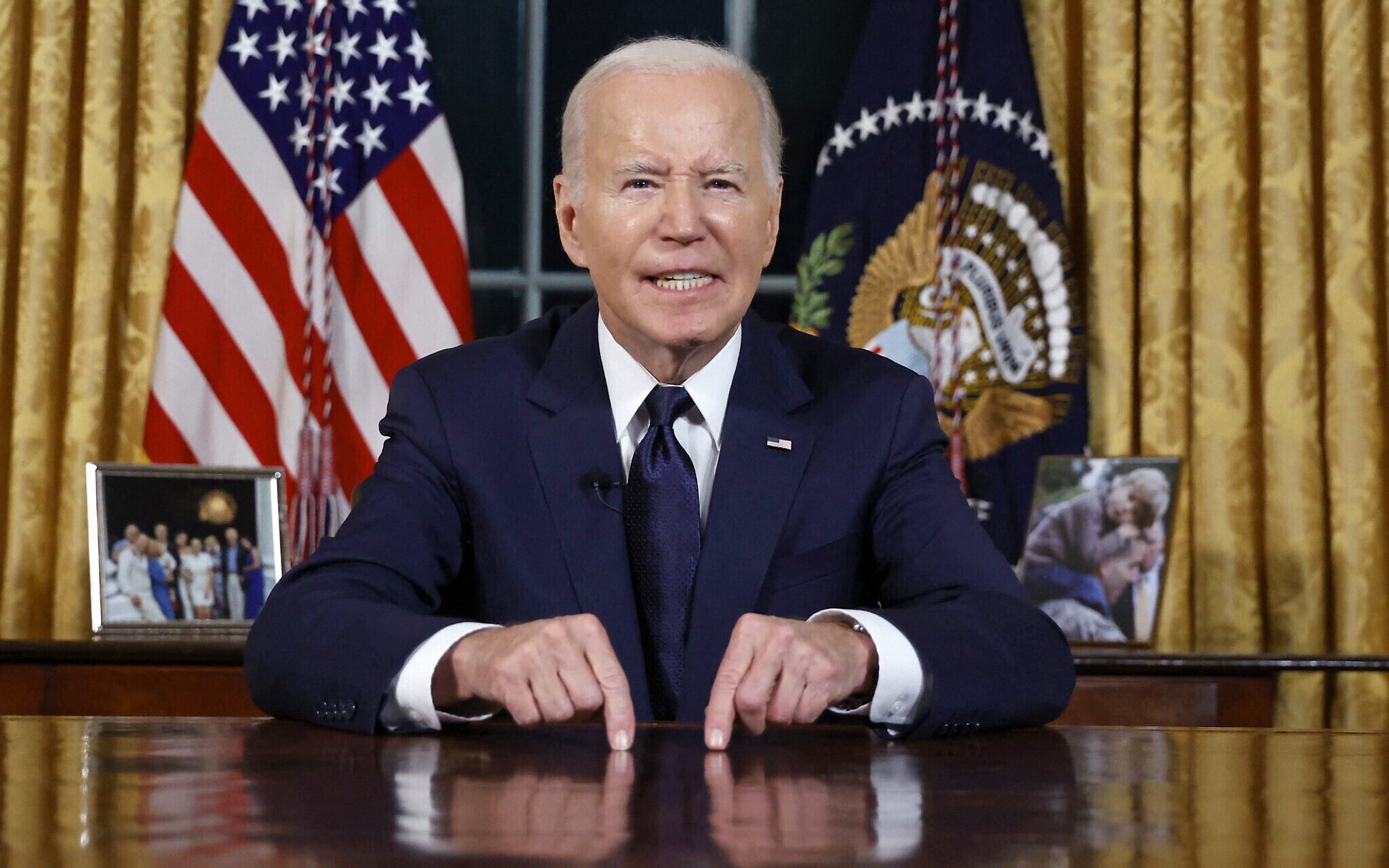
Hi. Joe Biden here, asking for more money for Ukraine and Israel.
Many Americans are asking: why, while millions of Americans are unemployed and getting evicted and starving and homeless, should we ignore our own people and send billions of dollars to foreign countries instead? The answer is: democracy. We have to defend democracy.
Ukraine and Israel aren’t just democracies. They’re special democracies.
Very special democracies.
Ukraine, for example, is the kind of democracy that doesn’t hold elections for local offices. There were supposed to be parliamentary elections, this month, but…yeah. There weren’t and there won’t be. Don’t worry, it’s perfectly legal because after the war with Russia started in February 2022, martial law was declared and the Ukrainian Constitution doesn’t allow elections under martial law.
Ukraine is so democratic that it doesn’t even need to have presidential elections anymore. Martial law again. And who declared martial law? Why, it’s that sly rascal President Volodymyr Zelensky—make that President-for-Life Volodymyr Zelensky. We’re so dysfunctional here in the U.S. that House Republicans can’t agree with themselves who should be Speaker. But Ukraine is streamlined! The guy who would be running for reelection this spring won’t have to, because he personally said so! That’s a very special democracy.
Under “martial law,” a term that no one has ever managed to define, Ukraine is a kind of democracy in which “conducting referendums, organizing strikes, and holding public demonstrations and other mass gatherings are prohibited.” Special!
President-for-Life Zelensky points out: “according to the [martial law] legislation, it is forbidden to hold elections.” Legislation that he signed unilaterally, of course. He is so committed to the rule of law that he refuses to unilaterally cancel a law that he unilaterally created in order to cancel the rule of law.
As everyone knows, you don’t need to hold elections to call yourself a democracy. Aside from martial law, there would be some big logistical challenges to holding an election right now. Like, Zelensky could lose! In the last poll of Ukrainians before the war, 53% of voters disapproved of his job performance and 38% approved.
Also, an election without other candidates and parties isn’t much fun. Ukraine has banned all left-wing parties, and also banned 11 other parties, including the biggest one, whose leader is under house arrest. Better not to bother.
Even if there were other parties and candidates to run against Zelensky, which there are not, they wouldn’t be able to campaign because “conducting referendums, organizing strikes, and holding public demonstrations and other mass gatherings are prohibited” under martial law. Who needs campaign rallies, because who would report about them anyway? His Excellency the President-for-Life has imposed state censorship on newspapers, shuttered opposition websites and shut down all opposition TV outlets and consolidated them into his own state TV platform. He calls it a “unified information policy.” No more channel changing! Save on monthly subscriptions to media apps!
The U.S. spent over $14 billion on the 2020 election. Ukraine is a very efficient democracy. They’re spending nothing at all! We must defend this penny-pinching beacon of freedom.
Israel, I like to say, is “a safe, secure, Jewish, and democratic state.” OK, not that safe. But, like Ukraine, it’s a democracy. Israel is a very very special kind of democracy.
In a democracy, the right to vote is one of the most fundamental privileges accorded to a citizen. The trouble is, sometimes people vote incorrectly. And in a democracy, all you need to do to be considered a citizen is to be born and live in the country.
To fix this problem, Israel has decided that only its very best people—the 9.6 million residents of Israel “proper”—can be citizens. The 2.4 million Palestinians in Gaza or the 2.7 million Palestinians in the West Bank are, as the vernacular goes, S.O.L. (The 500,000 Israeli settler-colonists squatting in the West Bank are, however, fully vested voters.)
Of the 9.6 million Israelis in Israel proper, 2.0 million are Israeli Arabs and 500,000 are neither Jewish nor Arab. If they and the West Bank settlers voted alongside their fellow 5.1 million Arabs in Gaza and the West Bank in a unified Israeli-Palestinian state, there would be 7.6 million Jews almost tied with 7.1 million Arabs.
Too much democracy.
On the other hand, 5.1 million Palestinian citizens of their own viable nation-state in a two-state scenario would present a different problem. The Republic of Palestine would have a seat at the United Nations, embassies and consulates all over the world, foreign news bureaus. Journalists and tourists could freely come and go. Palestinian citizens would talk. They’d complain, even about Israel. I mean, they do that now—but people might pay attention and—God forbid—care!
So Israel has an à la carte democracy. They lock the Palestinians away in Gaza and the West Bank, out of sight and out of mind, stateless and hopeless and voiceless, under Israeli occupation but without the right to vote. The Jewish “majority” of Israel enjoys the Middle East’s only thriving democracy.
Imagine how cool it would be if we could do that here! Turn the flyover “red” states into an occupied stateless concentration camp without voting rights. The remainder, the coastal “blue” states, would become a liberal paradise. No more Trumpies. Abortion rights—back. E-vehicle charging stations everywhere.
Israel has biggified democracy!
So, my fellow Americans, please join me in supporting Ukraine and Israel, these two very special, very expensive democracies.
While you’re still allowed.
(Ted Rall (Twitter: @tedrall), the political cartoonist, columnist and graphic novelist, co-hosts the left-vs-right DMZ America podcast with fellow cartoonist Scott Stantis. You can support Ted’s hard-hitting political cartoons and columns and see his work first by sponsoring his work on Patreon.)
You Can’t Go Home, Home Again
While Joe Biden’s house in Wilmington, Delaware is renovated for upgraded security, he said that he was staying at his luxurious home in Rehoboth Beach instead. “No, I’m not homeless,” he said, oddly. “I just have one home. I have a beautiful home. I’m down here for the day because I can’t go home, home.” Plus there’s the place in Washington.

